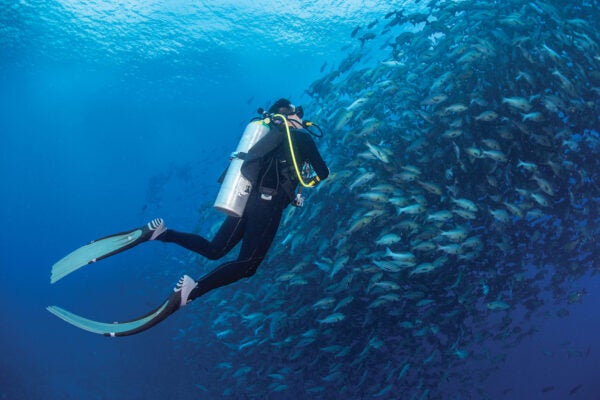The University of Texas at Austin Marine Science Institute can feel like the edge of the world. It stands on a corner of Mustang Island, surrounded by windswept grassy dunes and a seemingly endless expanse of Gulf water. But this unassuming campus is perfectly positioned to study our planet’s largest resource. MSI isn’t an edge; it’s a forefront.
“Seventy-one percent of the globe is covered by seawater,” says Robert Dickey, director of the Marine Science Institute. “It regulates our environment, our climate, and it feeds over a billion people from the seafood that we draw from it. It produces half of the oxygen that we breathe, and it actually absorbs the CO2 at the same time. It’s a very important facet of our world.”
Dickey’s passion for the ocean is apparent. His office is covered with framed photos of fish and other underwater scenes. A surfboard rests against a wall in one corner. In another, a 3-foot-tall fossil showcases an early starfish ancestor.
Dickey has been head of the institute since 2013, and his term has been shaped by natural disaster. Hurricane Harvey made landfall here as a Category 4 hurricane in August 2017. MSI endured wind gusts as high as 132 mph. Pebbles from MSI’s gravel roof became projectiles, smashing the windows of adjacent buildings.
“We were severely damaged by Harvey,” Dickey says. As he spoke, a team was down the hall, updating large windows in a breezeway with hurricane-resistant panes.
MSI sustained an estimated $45 million in damage and lost most of its research fish. Some buildings such as the Marine Science Education Center are still closed. The institute estimates that it was about 65% recovered by the start of 2019.
“UTMSI is a tremendous asset to our area. It is vitally important to support and rebuild its facilities post-hurricane,” says Rep. Todd Hunter, R-Corpus Christi, who represents the area in the Legislature and has been a strong advocate for securing the funds to rebuild.
As MSI recovers from Harvey, it will continue to build upon a nearly 80-year history of excellence. The institute has produced world-renowned science, aquaculture breakthroughs and ever-evolving sets of data. MSI works to communicate those discoveries through public outreach and education programs that improve ocean literacy.
“We’re a tight-knit community in Port Aransas, and The University of Texas’ Marine Science Institute has been a building block of the community for decades,” says Port Aransas City Manager David Parsons. “Port Aransas is fortunate to have a partner like the university that provides both sought-after jobs and high-quality science. As a tourism-based economy, Port Aransas benefits from the research they do on our coasts and fisheries.”
While the science shines at MSI, Dickey says the people drive the discovery. Harvey might have damaged the buildings, but the team has pulled together to maintain MSI’s mission. Staff members, faculty members and students work together so this small outfit can make an outsized impact.
“The staff are just so talented. And they work hard,” Dickey says.
GREENER GRASS
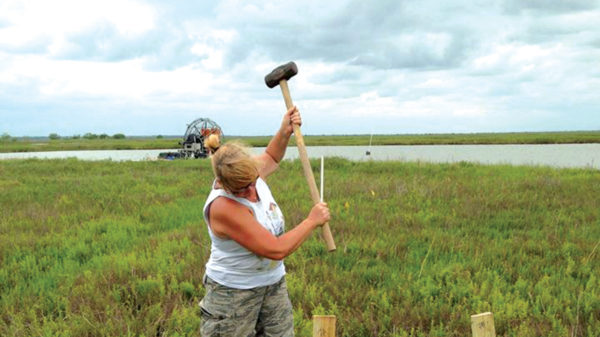
“I love my job!” Kimberly Jackson shouts over the Gulf wind. Waves lap against the boat as she reaches out to help her colleague Caitlin Young filter a seabed soil sample.
It’s a sunny but windy day in the middle of the Upper Laguna Madre, a salty lagoon on the Texas coast between Corpus Christi and North Padre Island. Jackson is a research scientist associate in professor Ken Dunton’s lab. She and Young, the lab’s research assistant, are making routine measurements of the water and the seabed, tracking the seagrass meadows in the area. An MSI team has been coming to the same spot for 30 years. Dunton took the first measurements there in 1989.
Jackson has been returning to this spot for almost as long. She started working for Dunton in September 1991 and has handled his research and team ever since.
“She’s fantastic,” Dunton says. “You just have to have that continuity for long-term data sets.”
Jackson worked full time with MSI through December 2017 and has continued on a part-time basis since then.
“My job is to help facilitate the work of graduate students in our lab. Much of this is done with field work and lab analysis,” Jackson says. “Who gets to play in the water all day and get paid for it? Other times we are tromping in the marsh areas, getting dirty. You could say I’m the glue that holds the lab together. Consistency is very important in any research.”
The research has proved essential. Seagrass beds are the foundations of a healthy ecosystem in Gulf estuaries, and Dunton and his team have been able to determine what parameters affect the health of seagrass beds. The work answers basic scientific questions, but it also has everyday applications.
“Seagrasses are valued greatly in Texas because of the fact that they support a sport fishery and a commercial fishery worth millions and millions annually,” Dunton says.
Dunton has served as an adviser on a number of industry and government projects. Most recently, he assembled a team to analyze a Texas Department of Transportation plan to build a second causeway, or bridge, from South Padre Island to the mainland. The proposed bridge would span the Lower Laguna Madre, home to a majority of Texas’ seagrasses.
“I called my colleagues from coast to coast … I got some of the best seagrass ecologists from across the country,” Dunton says. “What we had concluded was that the mitigation required to offset the loss of seagrasses that were expected as a result of that causeway was enormous. The mitigation that they had planned was probably not going to work very well.”
Dunton presented the findings to the Transportation Department, along with his team’s suggestions.
“We gave them lots of really good information and tried to advise them on how they might want to change things or rethink things,” he says.
The project leaders accepted many of his team’s suggestions, and they will address more of the ecological costs as the project moves forward.
Dunton says he sees this as a great example of how MSI’s work can help guide development.
“Science can inform management. It’s not ‘us versus them.’ ” he says. “Everybody’s a winner here.”
PLENTY OF FISH
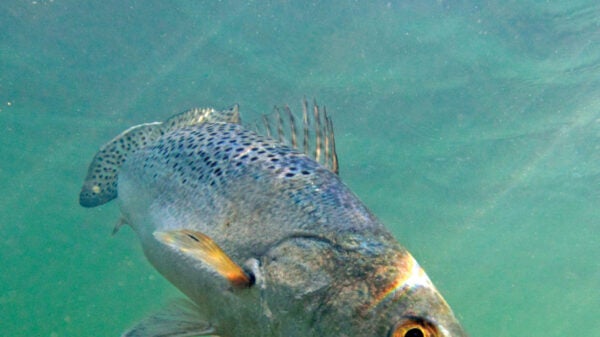
Cindy Faulk is a Longhorn through and through. She earned a bachelor’s degree in Austin and a master’s degree primarily at MSI, and she’s now a staff member, working for MSI’s Fisheries and Mariculture Laboratory, or FAML. She’s been part of UT since 1987.
Faulk works for professor Lee Fuiman, the associate director of FAML, and in 2016 she was awarded an Outstanding Staff Award by the Office of the President. Although she orders supplies, helps write grant proposals and manages personnel, she’s primarily a scientist.
“I am really a larval fish biologist,” she says. “In a sense, I am a fish farmer.”
Faulk oversees a mixture of ecological and aquaculture nutrition studies. Alongside studies in basic fish biology, physiology and fish ecology, Fuiman’s lab works to optimize aquaculture, or aquatic farming, techniques. The goal is to develop methods to rear southern flounder, pigfish and Atlantic croaker in captivity.
Faulk and Fuiman are building upon a storied history at FAML. Connie Arnold, the first associate director of the laboratory, was a pioneer in the field.
“The original research that allowed us to spawn redfish and flounder all started right here,” Faulk says. “Dr. Connie Arnold was one of the first people in the world to spawn marine fish in captivity.”
Marine fish are notoriously hard to breed in a lab. Arnold was able to develop a way to mimic the conditions of the natural environment.
“You control temperature, and you control (light), and you basically make the fish think that it’s time to spawn. By doing that, he was able to spawn them year-round,” Faulk says.
These techniques helped the Texas Parks and Wildlife Department to develop a stock enhancement program. Each year the department spawns redfish and spotted sea trout in captivity and releases them into the wild to help bolster their populations.
“Parks and Wildlife’s entire stock enhancement was built using the tools that Connie Arnold first developed here,” Faulk says.
FAML’s research continues to influence the program, especially as climate change has begun to affect fish populations.
Joan Holt, FAML’s second associate director, explored the temperature tolerance of the different flounder life stages. She found that flounder larvae are extremely sensitive to temperature; they can survive colder temperatures, but warmer water can be devastating.
“When you have natural or climate-change-related changes in the water temperature during a particular winter, and it’s warmer in the Gulf, the larval populations don’t survive,” Faulk says.
Texas Parks and Wildlife has relied on FAML’s flounder studies to start a stock enhancement program for the species. They have successfully released juvenile flounder along the coast and plan to expand the program in the coming years.
The lab continues to develop new aquaculture techniques to address emerging problems.
Recently, for example, Atlantic croaker have become a popular bait fish. Commercial fisheries wild-catch croaker to sell to the recreational fishing industry.
“The croaker populations have plummeted, and that’s all because of commercial fisheries trawling for them as bait,” Faulk says.
Croaker are an important part of the food web, and the fishing pressure has declined their populations.
“We don’t know what the long-term impacts are on the ecosystem in general,” Faulk says. “That can affect all the natural fish, crabs and everything else that feeds upon them.”
Faulk and Fuiman’s lab has been working on developing a way to rear Atlantic croaker in captivity. If aquaculturists can offer recreational fishers an alternative to the wild-caught croaker, natural croaker populations would be given an opportunity to recover.
If the effort proves fruitful, it would be another success story for an already acclaimed institution.
PRACTICAL MEASURES
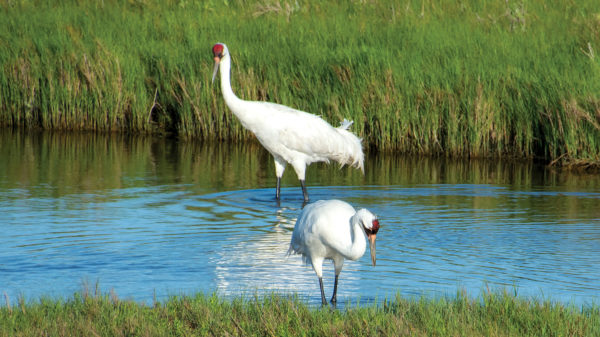
Professor Edward Buskey has been in Texas, working at MSI, for 32 years.
“I think in another year I’ll be able to actually legally buy a pair of cowboy boots,” Buskey says.
He grew up in the Northeast and was always drawn to the water. His childhood haunts, however, weren’t particularly thriving.
“There was a river that ran at the bottom of my street,” he says. “I loved to fish, but I never caught anything but eels. I remember seeing a turtle in there once, and I was flabbergasted.”
Since moving south, Buskey has become an expert on coastal estuaries. These are the places where freshwater rivers meet the sea. Their dynamic environments provide the conditions needed for many ocean species to reproduce.
“Estuaries are often referred to as the nursery grounds of the sea,” Buskey says.
These areas aren’t only important for marine ecologies; they also are essential for coastal industries and economies.
“Most of the commercially important and recreationally important species are estuarine-dependent,” Buskey says.
In 2006, the National Oceanic and Atmospheric Administration established the Mission-Aransas National Estuarine Research Reserve in the bays north of Port Aransas. There are 29 of these reserves, called NERRs, nationwide, and the Mission-Aransas NERR is the third largest. MSI administers the reserve, and Buskey serves as its research coordinator.
“They are areas where we monitor and do research to try to understand how human activities are interacting with the natural environment,” Buskey says.
Buskey is quick to extoll his reserve’s virtues.
“We are the winter home to the only wild flock of whooping cranes in North America,” Buskey says with pride.
Buskey’s team has been monitoring the area for 10 years. Their five monitoring stations collect data on seawater quality, temperature, salinity, oxygen, turbidity and pH values.
“We get a measurement every 15 minutes, 24 hours a day, 365 days a year,” Buskey says.
They also gather biological data. Buskey collects and preserves nutrient, plankton and vegetation samples.
“We also try to look at sea level rise and how much coastal subsidence there is,” Buskey says. “Because that’s a real big issue in Texas.”
Buskey is one of Texas’ lead estuary scientists. This research reserve data set and other studies Buskey has been involved in have provided essential guidance for Texas policymakers.
Estuaries are sensitive environments, and the amount of fresh water entering the system can determine the health of the ecosystem. In drought years, municipalities often hold back water in their dams for human use. Evaporation at the coasts can create hypersaline estuaries, which can be devastating for wildlife. To avoid such problems, the Texas Water Development Board funded studies looking at freshwater inflows along the Texas coast.
“We needed to come up with some criteria to determine how much fresh water you need to maintain productivity,” Buskey says. “It’s a pretty complicated question.”
Buskey and other scientists gave their analyses to the Texas Water Development Board, and they spoke to the stakeholders.
“You talk to the scientists first, and then you talk to the water users,” Buskey says.
Buskey says he thinks it’s feasible to balance the need to conserve with the needs of industry. His work in the Mission-Aransas research reserve shows that it’s possible.
“We’re the only National Estuarine Research Reserve that has active oil and gas production within our bounds,” he says. “Yet the system is still very productive and relatively pristine.”
Texas is a particularly strong place to mix conservation needs with development goals, he says.
“In Texas, I find it’s really easy to talk to people about conservation,” Buskey says. “Do you want your grandkids to be able to fish the way you fished your whole life? Do you want them to be able to go out and hunt ducks along the coast? Of course, the answer is ‘yes.’ ”
He says he has been awed by the progress that has been made on this issue. He recently returned to the river he grew up by, the one that was once home to only a few eels.
“There were dads with their kids down there catching bass,” he says. “That river has recovered so much.”
Although much has been done, he says he knows that his work and the work of others will pave the way forward as climate change continues to reshape the environment worldwide.
“Even our 10-year data set shows … seawater temperatures have risen measurably. Statistically significantly,” he says.
He has seen the species in the area change as the winters warm. Tropical mangroves have begun to thrive in an environment that used to exclude them. If salt marshes become mangroves, the whole ecosystem would change. Buskey fears that could affect one of the Mission-Aransas reserve’s most fragile residents.
“Will those whooping cranes be able to nest further up the shore?” Buskey asks.
REELING IT IN
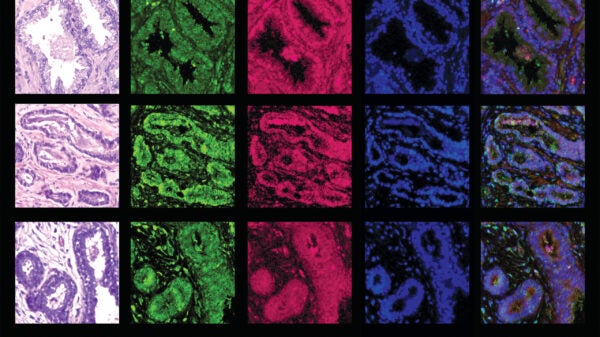
Sometimes breakthroughs can be found in unexpected places. Peter Thomas, a professor at MSI, has spent his career studying fish reproductive physiology. That work has led to discoveries that could change how we treat common human diseases such as cardiovascular disease and some cancers.
“My basic work in fish has led to studies in biomedical models that have important implications for human health,” Thomas says.
Researchers in his lab were studying fish ovaries when they discovered and characterized an endocrine steroid receptor on the cell membrane. This was jaw-dropping: Steroid receptors were usually found on the nuclear envelope, inside the cell, but these receptors were on the outside of the cell.
“The first receptor discovered by us was actually the first nontraditional steroid receptor found in any vertebrate,” Thomas says. “It was found in spotted sea trout ovaries.”
This discovery happened at a perfect time. The human genome had just been published, and suddenly Thomas’ work had broader implications.
“We showed that the receptor we’d identified in sea trout ovaries was also a receptor for progesterone in human tissues and in other mammalian tissues,” Thomas says.
Thomas’ team was ready to explore the human receptors. He completed a doctorate in physiology at the University of Leicester, so he was poised to translate his work into human applications.
“I’ve always felt that you need to take your science to a wider audience,” Thomas says.
Cell receptors, like the ones Thomas and his team have found and characterized, can act as control switches for cell behavior. Cells communicate via these highly specialized receptors, and receptors interact only with specific chemicals. Therapies that turn receptors “on” or “off” have proved essential for health care.
“Eighty percent of the drugs that we use today target receptors of one kind or other,” Thomas says.
Thomas’ lab has discovered three major membrane steroid receptors: progesterone, estrogen and androgen. While working to identify all the estrogen and androgen receptors, his lab continued to uncover interesting characteristics of his original discovery.
“We did show that certain subtypes of this (progesterone) receptor were up-regulated in breast cancer,” he says.
Because cancer cells up-regulate, or increase production, of this receptor, it could eventually prove to be an important protein in cancer diagnosis or treatment.
“There are numerous cancers where this particular receptor might be a good biomarker or maybe a good target,” Thomas says. “Progesterone causes these cells to survive, which is not what you want for cancer cells.”
Thomas and his team have also demonstrated that progesterone and its receptor play a protective role in cardiovascular tissues. Progesterone relaxes the cells that line blood vessels by increasing production of nitric oxide, and this process is mediated through the same membrane progesterone receptor that his lab first identified in spotted sea trout.
Progesterone also can have more immediate effects.
“We found that (progesterone) also acts directly on the muscle cells to cause relaxation,” Thomas says.
Promising results from progesterone receptor studies have pushed Thomas’ work forward. His lab is currently characterizing the androgen receptor.
“We have new data to show that androgens are really important for wound healing,” he says.
Although Thomas’ focus has remained on fish ovaries and human cell lines, he hopes that his observations will lead to more mammalian studies.
“My goal has been to provide the scientific background for studies on the clinical aspects of my research,” he says.
Dickey, the director of MSI, says he sees Thomas’ work as a prime example of how basic research pushes science forward.
“You never know what the unexpected outcome of a lot of basic research is. Discovery begets discovery and application,” Dickey says.
Thomas’ work has opened new doors. He knows that other scientists can build on his lab’s discoveries and quickly progress into new territory.
“You never know until you get to the top of the mountain what’s the best way up,” Thomas says.
